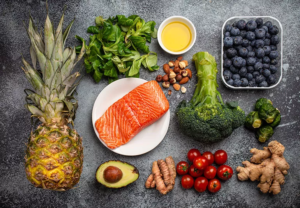Gut health is a term that refers to the state of your gastrointestinal (GI) tract, which includes your stomach, small intestine, and large intestine (colon). It is very important for overall well-being. The gut contains a diverse community of microorganisms called the gut microbiota, which affects digestion, nutrient absorption, immune system function, mental health, inflammation, chronic diseases, weight regulation, and more. A balanced gut microbiota is crucial for optimal health, and factors like diet, exercise, sleep, and stress management play roles in maintaining it. Poor gut health has been linked to various digestive disorders, allergies, autoimmune conditions, and even mental health issues.
A healthy gut is essential for overall well-being as it plays a vital role in digestion, nutrient absorption, immune function, and even mental health. An imbalance in gut health can lead to various issues like irritable bowel syndrome (IBS), inflammatory bowel disease (IBD), and even impact systemic health.
Prebiotics and probiotics are two categories of substances that can help improve gut health:
Prebiotics:
Prebiotics are types of dietary fibers that are non-digestible by our bodies but serve as a source of nutrition for beneficial bacteria that reside in our gut. These beneficial bacteria, collectively known as the gut microbiota, play a crucial role in maintaining overall health, supporting digestion, boosting the immune system, and even influencing mental health.
In simple terms, prebiotics are like food for the good bacteria in our gut. They encourage the growth and activity of these beneficial bacteria while discouraging the growth of harmful ones. Common sources of prebiotics include foods high in dietary fiber, such as whole grains, vegetables (like onions, garlic, leeks, and asparagus), oats, fruits (like bananas), and legumes.
Probiotics:
Probiotics are live microorganisms (mostly bacteria but sometimes yeasts) that, when consumed in adequate amounts, provide health benefits to the host (that’s us!). These live microorganisms can help restore and maintain a healthy balance of gut bacteria, especially after disruptions like taking antibiotics, which can kill off both harmful and beneficial bacteria.
Probiotics are present in various fermented foods and supplements. Common sources of probiotics include yogurt, kefir, sauerkraut, kimchi, miso, tempeh, and certain types of pickles. Each probiotic strain may have slightly different effects on the body, so different strains may be recommended for different health conditions.
A healthy gut is essential for overall well-being, and certain foods can promote gut health by providing beneficial nutrients and supporting the growth of beneficial gut bacteria. Here’s a simple chart of foods that are generally considered good for gut health:
| Food Group | Examples of Foods | Benefits for Gut Health |
|---|---|---|
| Fiber-Rich Foods | Whole grains (oats, quinoa, brown rice), legumes (beans, lentils), fruits (berries, apples), vegetables (broccoli, carrots) | Supports the growth of beneficial gut bacteria, helps regulate digestion. |
| Probiotic Foods | Yogurt, kefir, fermented vegetables (sauerkraut, kimchi), kombucha | Contains live beneficial bacteria that can populate the gut and improve gut flora. |
| Prebiotic Foods | Garlic, onions, leeks, asparagus, bananas, chicory root | Provides food for beneficial gut bacteria, promoting their growth and activity. |
| Healthy Fats | Avocado, olive oil, nuts, seeds | Support gut lining integrity and anti-inflammatory processes. |
| Lean Proteins | Lean meats, poultry, fish, tofu | Essential for tissue repair and overall health. |
| Antioxidant-Rich Foods | Berries, dark leafy greens, colourful vegetables | Reduce inflammation and oxidative stress in the gut. |
| Bone Broth | Homemade bone broth (chicken, beef) | Contains collagen and amino acids that can support gut lining health. |
| Fermented Dairy Alternatives | Non-dairy yogurt, kefir made from coconut or almond milk | Offers probiotics for those who are lactose intolerant or prefer plant-based options. |
| Herbs and Spices | Ginger, turmeric, peppermint | Can have anti-inflammatory and soothing effects on the gut. |
When aiming to improve gut health, it’s important to consider both prebiotics and probiotics. Consuming a diet rich in prebiotic foods can provide the necessary nutrients for beneficial bacteria to thrive, while incorporating probiotic-rich foods or taking probiotic supplements can introduce live cultures of helpful microorganisms directly into your gut.
Keep in mind that the effects of prebiotics and probiotics can vary from person to person, and the research in this field is ongoing. If you have specific gut-related concerns or conditions, it’s a good idea to consult a healthcare professional, if you are in Mumbai, speak to the best dietician in Mumbai for weight loss before making significant changes to your diet or taking supplements. Even the best weight loss center in mumbai, will first address your lifestyle and diet before writing supplements. Focusing on a well-balanced diet, staying hydrated, managing stress, and getting regular exercise are all important factors for maintaining optimal gut health.
Conclusion:
It’s important to note that while prebiotics and probiotics can contribute to better gut health, they are just one aspect of a healthy lifestyle that includes a balanced diet, regular exercise, adequate sleep, and stress management. If you’re considering adding prebiotic or probiotic supplements to your diet, it’s a good idea to consult with a healthcare professional or a Dietitian near you, especially if you have any underlying health conditions.







